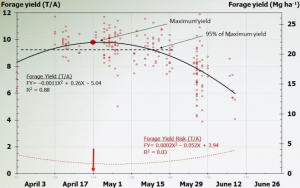Water is an extremely valuable input in agriculture, whether delivered through rain, snow or irrigation. This fact was made very apparent during the kickoff presentation at the recent Iowa Water Conference. In his presentation Water Issues in the Developing World, Dick Schultz (Iowa State University) detailed the different sources of water in our world. While it seems that there is “water, water, everywhere”, only 3% of the world’s water is fresh water, the balance resides in the oceans.
Of that fresh water, 69% is in glaciers, 30% is groundwater, 0.3% lakes, 0.06% soil moisture, 0.04% in the atmosphere, 0.06% in rivers and 0.003% in the biosphere. He went on to point out that 50% of the fresh water is in 6 areas: Canada, Russia, Tibet, Columbia, Brazil and Indonesia. 
Water has been a hot topic in the US news with stories of the California drought, an extremely snowy winter in the east and nutrient reduction strategies in the Midwest. A quick look at the Drought Monitor shows that drought conditions extend from California to Illinois. Continue reading

